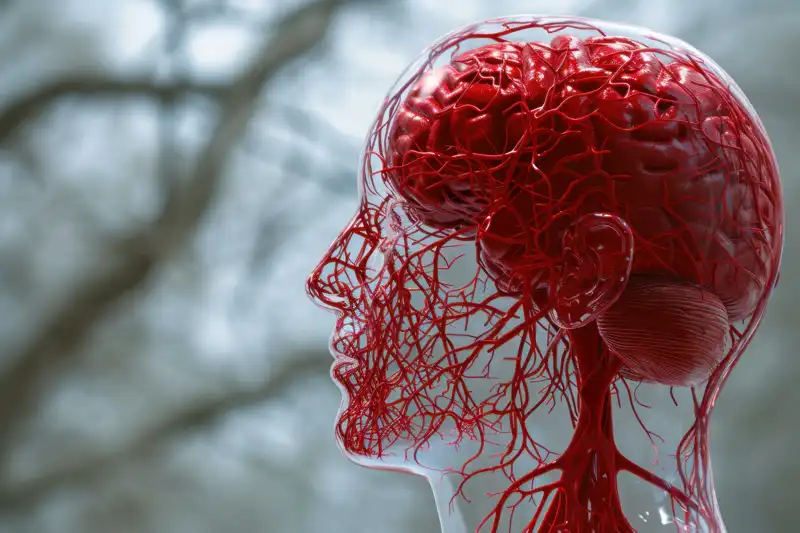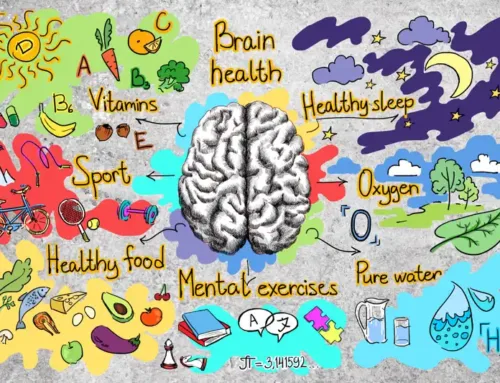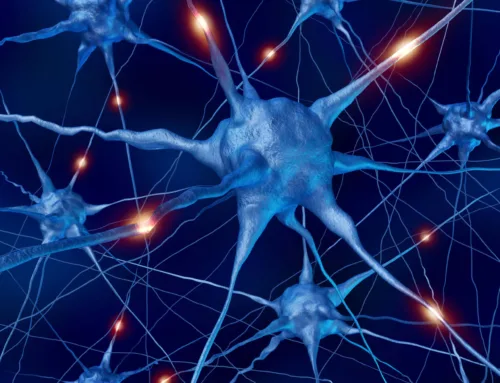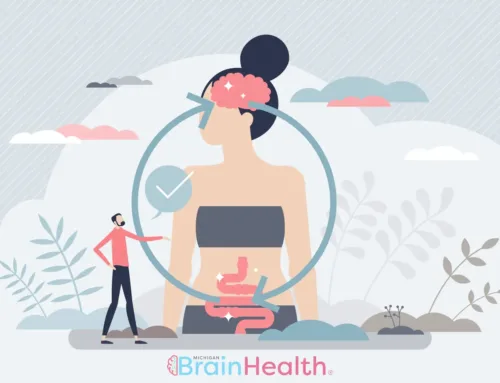The Importance of Sufficient Blood Flow to the Brain
Even on your worst day, having sufficient blood flow to your brain can make a significant difference in your overall well-being. Adequate cerebral circulation ensures that your brain receives the necessary oxygen and nutrients to function optimally. This can enhance cognitive abilities, improve mood, and increase energy levels. Conversely, insufficient blood flow can lead to symptoms such as brain fog, fatigue, and difficulty concentrating. Maintaining healthy blood flow is crucial for both short-term mental clarity and long-term brain health.
Even on your toughest days, sufficient blood flow to the brain can improve your condition, while on your best days, insufficient blood flow can diminish your well-being.
A major cause of brain fog, light-headedness, delayed recovery from concussions, and neurodegenerative conditions such as dementia and Alzheimer’s is insufficient blood flow to the brain. Additionally, erectile dysfunction can be linked to poor cerebral circulation, as inadequate circulation affects blood flow to all areas of the body.
Here are 9 methods to boost blood flow to the brain.
1. ENGAGE IN REGULAR EXERCISE
- Engaging in aerobic activities such as running, cycling, or brisk walking significantly enhances blood flow to the brain by increasing heart rate and promoting the efficient circulation of blood throughout the body. These activities help to deliver more oxygen and essential nutrients to brain cells, which can improve mental clarity, boost memory, and enhance overall cognitive function. Additionally, aerobic exercises can stimulate the production of neurotrophic factors, which support the growth and survival of neurons, further contributing to brain health. On the other hand, strength training, which includes exercises like weightlifting and resistance workouts, supports circulation by improving the efficiency of the cardiovascular system and enhancing the delivery of oxygen and nutrients to various tissues, including the brain. This combination of aerobic and strength training exercises not only promotes better blood flow but also contributes to a healthier, more resilient brain over time.
- Practicing yoga and stretching can significantly enhance blood flow by promoting relaxation and encouraging deep breathing, which in turn helps to reduce stress and tension in the body. Yoga involves a series of postures and movements that gently stretch and strengthen muscles, improving flexibility and circulation. The deep breathing techniques associated with yoga increase oxygen intake, which is essential for nourishing brain cells and improving mental clarity. Stretching, on the other hand, helps to release muscle tightness and improve blood flow to various parts of the body, including the brain. Together, these practices not only support better circulation but also contribute to a sense of calm and well-being, making them effective tools for maintaining both physical and mental health.
2. INCREASE NITRIC OXIDE LEVELS
- Nitric oxide (NO) is a vital molecule that plays a crucial role in maintaining the health and flexibility of blood vessels, ensuring efficient blood flow throughout the body. It is naturally generated during physical activity, as exercise stimulates the production of NO, which helps to dilate blood vessels and improve circulation. However, certain factors can negatively impact natural NO levels. For instance, the use of mouthwash can inadvertently reduce NO production by killing beneficial bacteria in the mouth that are involved in the conversion of nitrates to nitric oxide. Similarly, antibiotics can disrupt the balance of gut bacteria, which also play a role in NO synthesis. To counteract these effects and boost NO levels, it is beneficial to engage in regular physical exercise, which naturally enhances NO production. Additionally, incorporating nitrate-rich foods into your diet, such as beets, spinach, and arugula, can further support NO levels. These foods contain compounds that are converted into nitric oxide in the body, promoting better vascular health. For those who may need additional support, considering NO-enhancing supplements can be a viable option to ensure optimal levels of this important molecule, thereby supporting overall cardiovascular health and efficient blood flow.
- Think about using supplements that enhance nitric oxide, such as Nitric Balance.
- Discover more about the connection between nitric oxide and heart health at my colleague Dr. Christy Sutton’s heart health workshop. Find out if you have genetic factors that reduce your nitric oxide levels by obtaining your Genetic Detoxification report, also from Dr. Christy Sutton.
3. Consider Brain-Boosting Herbs
- Herbs such as ginkgo biloba, vinpocetine, and huperzine A are renowned for their ability to enhance cognitive function and improve circulation, making them valuable allies in maintaining brain health. Ginkgo biloba, for instance, is known for its antioxidant properties and its ability to increase blood flow to the brain, which can help improve memory and cognitive speed. Vinpocetine, derived from the periwinkle plant, is often used to support brain metabolism and protect against cognitive decline by enhancing cerebral blood flow and oxygen utilization. Huperzine A, extracted from Chinese club moss, is recognized for its potential to improve memory and learning by inhibiting the breakdown of acetylcholine, a neurotransmitter crucial for cognitive processes. To harness the benefits of these powerful herbs, it is advisable to seek out high-quality supplements that contain these ingredients in effective dosages. One such option is Vibrant Mind®, a comprehensive supplement that includes vinpocetine, ginkgo, huperzine A, and other potent botanical extracts and advanced nutrients. This formulation is specifically designed to support healthy neurological function, sharpen mental acuity, and promote overall cognitive well-being, making it an excellent choice for those looking to enhance their brain health and maintain mental sharpness.
4. ENGAGE IN DEEP BREATHING AND MINDFULNESS PRACTICES
- Deep breathing exercises are a powerful tool for enhancing oxygen absorption in the body, which in turn promotes better circulation by ensuring that oxygen-rich blood reaches all vital organs, including the brain. This increased oxygen supply can lead to improved mental clarity, heightened focus, and a greater sense of overall well-being. Additionally, engaging in meditation practices can significantly help alleviate stress by calming the mind and reducing the production of stress hormones. This relaxation response not only decreases blood pressure but also supports cardiovascular health, contributing to more efficient blood flow throughout the body. Furthermore, alternate nostril breathing, a traditional yogic practice, involves a specific pattern of breathing that balances the flow of air through both nostrils. This technique is known to boost concentration by harmonizing the left and right hemispheres of the brain, leading to enhanced cognitive function. By incorporating these practices into your daily routine, you can effectively support both your physical and mental health, fostering a state of calm and improved brain function.
5. KEEP HYDRATED
- Dehydration can lead to the constriction of blood vessels, which in turn reduces the efficiency of blood flow throughout the body, including to the brain. This diminished circulation can result in decreased delivery of oxygen and essential nutrients to brain cells, potentially impairing cognitive functions such as concentration, memory, and alertness. To counteract these effects and maintain optimal brain health, it is crucial to consume an adequate amount of water daily. Staying well-hydrated helps to keep blood vessels dilated, ensuring that blood can flow freely and efficiently, thereby supporting both physical and mental well-being. By making a conscious effort to drink sufficient water, you can enhance circulation, promote better brain function, and contribute to overall health and vitality.
6. REDUCE INTAKE OF STIMULANTS AND ALCOHOL
- Excessive consumption of caffeine and alcohol can lead to the constriction of blood vessels, which in turn can impede the efficient flow of blood throughout the body, including to the brain. This narrowing of blood vessels can result in reduced oxygen and nutrient delivery to brain cells, potentially affecting cognitive functions such as focus, memory, and overall mental clarity. To maintain healthy circulation and ensure that your brain receives the necessary resources to function optimally, it is advisable to consume these substances in moderation. By doing so, you can help preserve the flexibility and health of your blood vessels, promoting better blood flow and supporting both your physical and mental well-being.
7. FOCUS ON GETTING QUALITY SLEEP
- Strive for 7-9 hours of restful sleep each night, as this is crucial for allowing your brain to undergo essential healing processes and effectively eliminate metabolic waste products that accumulate during the day. During sleep, the brain engages in a variety of restorative activities, such as repairing cells, consolidating memories, and clearing out toxins through the glymphatic system, which is particularly active during deep sleep stages. This process not only supports cognitive function and mental clarity but also enhances blood flow by maintaining the health and flexibility of blood vessels. By prioritizing quality sleep, you can ensure that your brain receives the necessary downtime to rejuvenate, ultimately promoting better circulation and contributing to overall brain health and well-being.
8. EXPLORE COLD EXPOSURE
- Cold showers or cold therapy involve exposing the body to low temperatures, which initially cause the blood vessels to constrict, reducing blood flow to the skin and extremities. This constriction is a natural response to preserve core body temperature. However, once the cold exposure ends, the body responds by dilating the blood vessels, a process known as vasodilation. This dilation increases blood flow, allowing a rush of oxygen-rich blood to circulate more efficiently throughout the body, including to the brain. This enhanced circulation can improve mental alertness, boost mood, and support overall cognitive function. Additionally, the practice of cold exposure can stimulate the production of norepinephrine, a neurotransmitter that plays a role in attention and focus, further contributing to improved brain health. Regularly incorporating cold showers or cold therapy into your routine can thus be a beneficial strategy for promoting better blood flow and supporting mental clarity and resilience.
9. Chiropractic Adjustments
- Chiropractic adjustments, especially those focused on the neck region, can play a significant role in alleviating muscle tension and enhancing circulation throughout the body. By ensuring that the vertebrae are properly aligned, these adjustments can reduce undue pressure on both nerves and blood vessels, which is crucial for maintaining optimal bodily functions. This realignment not only helps in relieving discomfort and improving posture but also facilitates the efficient flow of cerebrospinal fluid. This fluid is essential for cushioning the brain and spinal cord, as well as for delivering vital oxygen and nutrients to the brain. Improved cerebrospinal fluid flow can lead to enhanced brain function, better mental clarity, and a reduction in symptoms such as headaches and dizziness. Regular chiropractic care can thus be an effective strategy for promoting overall neurological health and ensuring that the brain receives the support it needs to function at its best.
Schedule a Free Evaluation or call (586) 488-4818 and see for yourself how beneficial the Michigan Brain Health neurofeedback program can be for your brain fitness.
Always remember one of my mantras, “The more you know about how your body works, the better you can take care of yourself.”
For more details about the natural approach I take with my patients, take a look at the book I wrote entitled: Reclaim Your Life; Your Guide To Revealing Your Body’s Life-Changing Secrets For Renewed Health. It is available in my office or at Amazon and many other book outlets. If you found value in this article, please use the social sharing icons at the bottom of this post, and please share with those you know who are still suffering from chronic health challenges, despite receiving medical management. Help me reach more people so they may regain their zest for living! Thank you!









